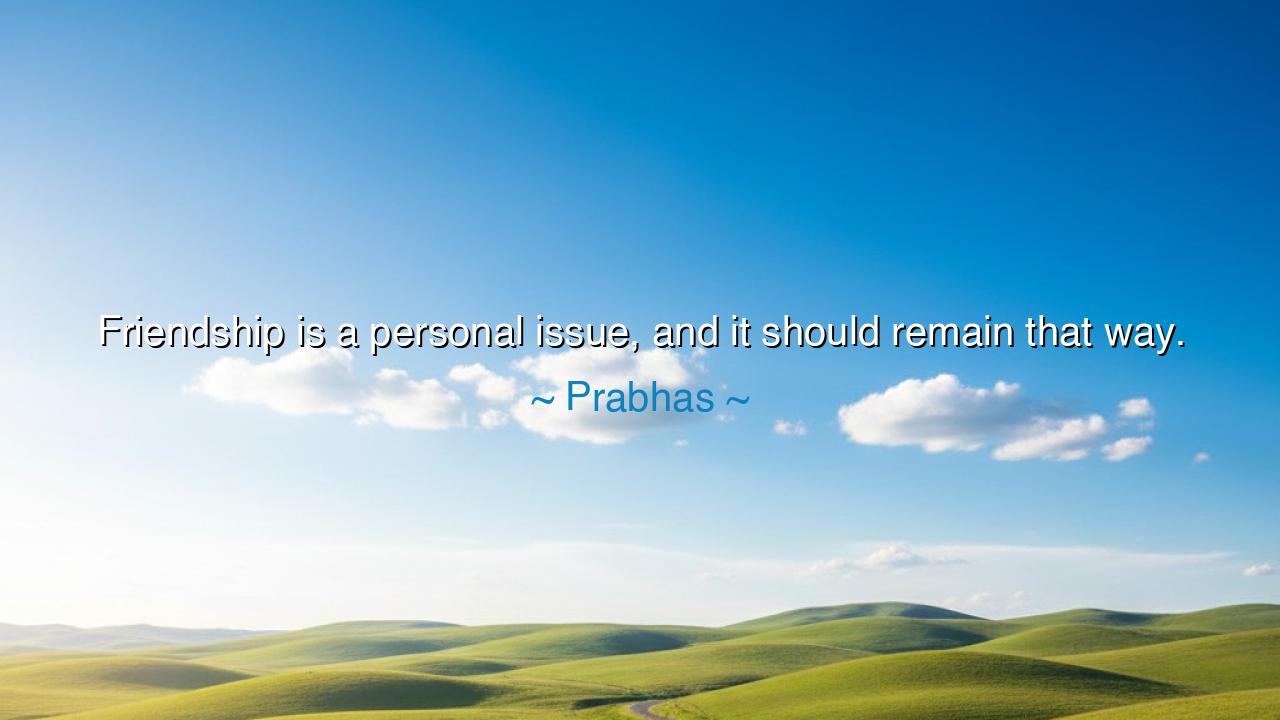
Friendship is a personal issue, and it should remain that way.






Hearken, O seekers of wisdom, to the words of Prabhas, who, with quiet authority, declares: “Friendship is a personal issue, and it should remain that way.” In these words lies a profound truth: that the bonds we forge are sacred, belonging to the soul alone, and not to the judgments or interference of the world. True friendship is born in the intimate chambers of the heart, nurtured in trust, loyalty, and shared understanding. It is not a commodity to be displayed for approval nor a spectacle to be measured by others’ eyes.
The origin of this insight is as old as human companionship itself. From the scrolls of antiquity, philosophers spoke of philia—friendship rooted in virtue and mutual respect. Aristotle wrote that such bonds are formed not for convenience or gain, but for the intrinsic value of shared souls. To allow friendship to be dictated or scrutinized by external forces is to weaken its roots, for the deepest connections thrive in privacy, in the space where hearts can speak freely without fear of judgment.
Consider the life of Sir Winston Churchill and his steadfast confidant Mahatma Gandhi—though from distant worlds and philosophies, the private trust and respect they cultivated in correspondence exemplifies how friendship, though sometimes invisible to the public eye, holds immense power. It was in letters exchanged behind closed doors that understanding, empathy, and mutual regard flourished, untouched by the clamors of the world. Their personal bond carried weight beyond mere acquaintance; it influenced lives and history in subtle but profound ways.
The essence of Prabhas’s declaration reminds us that friendship is a sacred contract between souls, not a stage for others to adjudicate. When external pressures, gossip, or expectation intrude, the purity of connection may wane, and misunderstandings can corrode even the strongest bonds. Hence, keeping friendship personal is not an act of secrecy but one of respect—for oneself, for the other, and for the integrity of the relationship.
Even in modern times, countless examples affirm this timeless wisdom. Consider the bond between Steve Jobs and Steve Wozniak, co-creators of Apple. Though their collaboration transformed the world, their personal friendship remained grounded in trust, mutual understanding, and private humor, shielded from the glare of public scrutiny. Their achievements were not merely technical but human, born from a friendship that was cherished as a personal sanctuary.
To guard the intimacy of friendship is to honor it. Share your joys, your fears, your ambitions within the circle of trust, and let no external opinion dictate the value of the bond. True friends will respect boundaries, and the deepest connections will grow in the quiet spaces of understanding. As the ancients taught, virtue is strengthened when it is chosen freely, not enforced, and friendship flourishes when nurtured in the privacy of shared hearts.
Let this teaching guide all who seek lasting bonds. Do not yield the intimacy of your friendships to the world’s scrutiny. Protect the sacredness of mutual trust, cultivate shared experiences away from judgment, and respect the personal nature of these connections. In doing so, you honor not only the other soul but the integrity of your own heart.
Thus, remember the wisdom of Prabhas: friendship, when treated as a personal and sacred matter, becomes a fortress against misunderstanding, a haven for joy, and a conduit for growth. Cherish it privately, nurture it with care, and let its power remain untainted by the noise of the world. In this, the bonds of friendship become eternal, resilient, and profoundly transformative.






AAdministratorAdministrator
Welcome, honored guests. Please leave a comment, we will respond soon